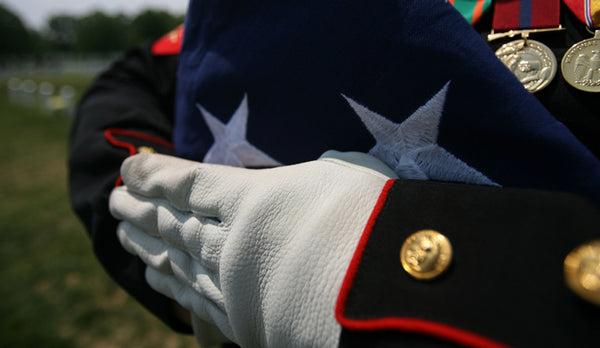VA Death Benefits - Sacred Honor
By Jerri Haaven - Certified Grief Recovery Specialist, Certified Celebrant

Click here to view our selection of our finest military themed cremation urns and keepsakes.
When a service member retires or leaves the armed forces, a number of available benefits can be utilized to help them transition to civilian life. These benefits include medical and mental health care, educational benefits, veteran status for employment opportunities and mortgage assistance, to name a few.
However, no other benefit is more revered or helpful than that of burial benefits provided to our nation’s fallen. Replete with symbolism, honor and respect, all active-duty personnel, veterans and their immediate family members who are eligible are entitled to burial benefits at a location of their choosing. These burial benefits help provide financial and emotional support to grieving family members.
If military burial benefits are important to you, this article might provide valuable information for planning ahead to ensure last wishes may be honored. By pre-planning your burial or cremation, you can ensure that your family members know exactly what your final wishes are and that you reside in the final resting place of your choosing.
National and State Cemeteries
Today, the National Cemetery Administration maintains 131 national cemeteries in 40 states (and Puerto Rico), as well as 33 soldier's lots and monument sites. There are also a number of state veterans cemeteries, which are not managed by the VA, but operate in much the same way. This large network of national and state cemeteries provides numerous options for veterans. Choose a cemetery near your final address or opt to be buried near where you were born.
It’s important to review and understand the requirements and differences for each type of cemetery well in advance. For example, a burial plot or columbarium cannot be reserved in advance at any national cemetery. Requests can only be made once a veteran or qualified family member has passed away. Therefore, be sure to know where to locate and obtain a certified copy of the veteran’s discharge papers (DD 214) since this paperwork is required to initiate the process. If you have a preference for a particular national cemetery, make sure your family members know about this in advance and can request a space at your preferred location.
The Veteran Administration covers the cost of the following:
- opening and closing of the grave
- perpetual care
- a Government headstone or marker
- a burial flag,
- and a Presidential Memorial Certificate
While the VA covers much of the cost of burial, other costs such as a funeral director, celebrant, chapel, casket or urn for ashes are at the expense of the family. Military honors (21-gun salute/rendering of TAPS) can be requested at the cemetery of choice, usually at no cost to the family. A formal request must be made for this particular honor.
Are cremated remains permissible?
Not all cemeteries designated for veterans have space available for burials. It is possible to find out in advance if a national cemetery of a veteran’s choosing has space available for a burial or if they only have space for cremated remains, which can be buried or interred. Cremated remains are provided with the same military honors as casketed remains.
To schedule a burial in any of the national cemeteries, fax all discharge documentation to the National Cemetery Scheduling Office at 1-866-900-6417 and follow-up with a phone call to 1-800-535-1117 to begin the process.
Casualty Assistance of the Armed Forces
Each branch of the Armed Forces has a Casualty Assistance Office or a Casualty Assistance/Mortuary Office that is responsible to provide compassionate support and guidance to the families of a service member who died during service to his/her country, or who is seriously injured or ill. The MilitaryOneSource website provides a list of the support next of kin can receive through a Casualty Assistance Office. The list includes:
- Transportation
- Explaining and assisting in applying for and receiving benefits and entitlements
- Obtaining copies of records, reports and investigations
- Legal matters (including tax issues)
- Receipt of personal effects
- Burial expenses
- Injury, mortuary, and funeral honors assistance
- Relocation assistance (including shipment of household goods)
- Liaison with other federal agencies
- Information and referral, including coordinating with outside agencies such as benevolent and philanthropic agencies
Arlington National Cemetery rules regarding cremation ashes
Arlington National Cemetery is likely the most recognized of all national cemeteries, and is the final resting place of more than 400,000 active duty service members, veterans and family members. Due to its popularity, it can take several weeks for a burial request to be processed and granted. Additionally, to inter cremated remains, families will be required to validate that a cremation urn contains 100 percent of the ashes received from the crematorium or funeral home before Arlington National Cemetery conducts the burial service. Therefore, keepsake urns with ashes that a family can bring home or the scattering of ashes are not permitted. If this is important to the family, it’s advised to consider other national cemetery options.
Burial at Sea and Ash Scattering
Qualified individuals can request a burial at sea. Both cremated and casketed remains are permitted. The ceremony is performed on any Naval vessel while the ship is deployed. Therefore, family members must understand they are not allowed to be present when the cremains or casketed remains are deposited into the water. However, the family will be notified of the date, time, and longitude and latitude of the disposition of their loved one’s ashes once the committal service has been completed. Cremated remains may either be scattered or submerged in an urn. For more information about a Burial at Sea, click here. All of the agencies mentioned are well prepared to assist a family in their time of need.
To alleviate additional heartache or stress in the midst of grief, it is helpful to become familiar with military protocol for funerals and memorials in advance, and understand the standards that have been established at all national or state cemeteries.
Click here to view our selection of our finest military themed cremation urns and keepsakes.

